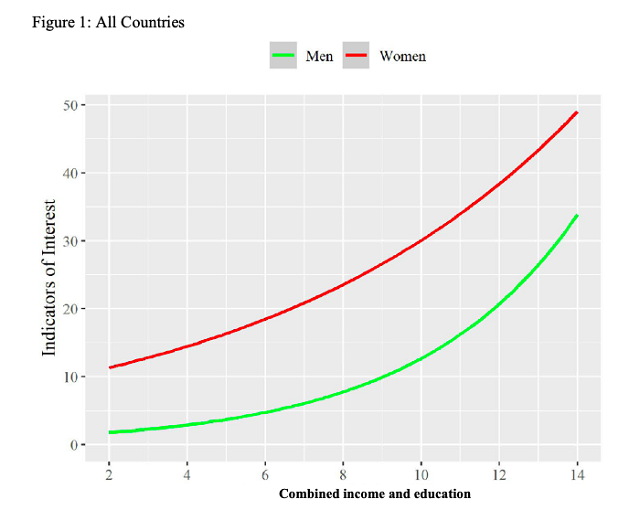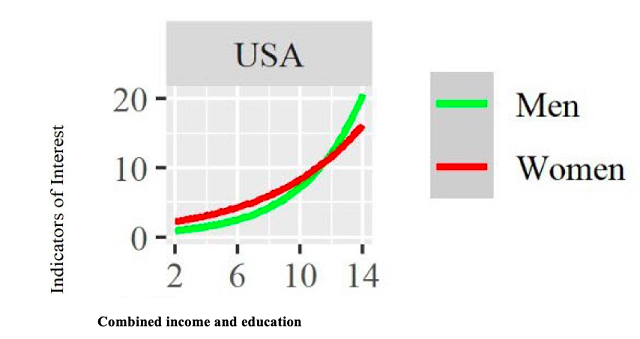Highlights
- Women are much pickier than men in their choice of potential romantic partners, although both men and women prefer people with more education and income on average. Post This
- While all individuals with higher than average combined income and education received more messages, likes, and winks than others, this trend was particularly pronounced for men. Post This
- A new study suggests that some of the dynamics depicted in the Netflix documentary, “The Tinder Swindler,” particularly the attractiveness of higher-income men on internet dating sites, are real. Post This
In the recent Netflix series “The Tinder Swindler,” young, attractive, high-earning women “swiped right” and were matched with a man they thought was handsome and rich. This supposed son of a billionaire diamond trader charmed them by his attentions, flights in his private jet, meals at fabulous restaurants, and then swindled them out of their money. This real life story of a man who conned women out of an estimated $10 million may seem outlandish, and not particularly relevant to the lives of ordinary people. Yet new research published by Peter Jonason and Andrew Thomas in the journal Human Nature suggests that some of the dynamics depicted in the tale of “The Tinder Swindler,” particularly the attractiveness of higher-income men on internet dating sites, are real. Using 1.8 million people from online dating sites in 20 different countries, this study looked at the effects of an individual’s sex and resource-acquisition ability (as measured by a combined score of education and personal income) on the number of “indicators of interest” (including messages, likes, and winks) that were posted on their profiles by others on the dating site.
The study found that women in all countries received more indicators of interest than men on internet dating sites (see Figure 1). Men in general were more likely than women to “swipe right” or the equivalent expression of interest: women received between 540% and 780% more indicators of interest than men. This is likely due, in part, to the fact that men are slightly more likely than women to use internet dating sites, but it also shows that women are much less likely than men to send expressions of romantic interest to prospective mates. The study also found that both women and men who were higher in both income and education received the most expressions of interest, suggesting that both men and women prefer partners with more education and income on average.
From that baseline, however, as combined income and education increased, interest increased faster for men than for women. Men with combined income and education that was one standard deviation greater than the mean received 255%—over three times—more indicators of interest than men with combined income and education that was one standard deviation less than the mean. In contrast, women with combined income and education that was one standard deviation greater than the mean received 103% more indicators of interest—about double—than women with combined income and education one standard deviation less than the mean. Thus, while all individuals with higher than average combined income and education received more messages, likes, and winks than others, this trend was particularly pronounced for men.

Source: P. Jonason and A. Thomas, "Being More Educated and Earning More Increases
Romantic Interest: Data from 1.8 M Online Daters from 24 Nations," Human Nature (2022).
Most of the countries in the data set were rich, westernized countries (Australia, Austria, Belgium, Canada, Denmark, France, Germany, Poland, U.S.A etc.), but some were less so (Mexico, Chile). It may be that some of the findings are due to characteristics of particular countries. Yet the effect of sex did not vary substantially by country, although the analysis found that the effect of combined income and education was reduced slightly in countries that were richer and had more women of reproductive age. The effect of combined income and education was also influenced by the proportion of the country not employed or in school, but these effects differed by sex. For those countries low in the proportion of the country not employed or in school (such as the U.S.A,), men with high income and education received relatively more attention (see Figure 2).

Source: P. Jonason and A. Thomas, "Being More Educated and Earning More Increases
Romantic Interest: Data from 1.8 M Online Daters from 24 Nations," Human Nature (2022).
Online dating has become ubiquitous in developed countries and is an important way for people to meet their future spouses. According to the Pew Research Center, 3 in 10 Americans have used a dating site or app. The study described here, the first to use real-life data from a large international online dating company, shows distinct sex differences in revealed preferences for romantic partners. Women are much pickier than men in their choice of potential romantic partners, although both men and women prefer people with more education and income on average. Men with high income and education are disproportionately preferred by women. The bottom line is that the findings indicate that women are more selective in romantic partners than men and more likely to prioritize resource-acquisition ability in a possible long term mate, a phenomenon fully exploited by the “Tinder Swindler.”
Rosemary L. Hopcroft is Professor of Sociology at the University of North Carolina at Charlotte. She is the author of Evolution and Gender: Why it matters for contemporary life, (Routledge 2016) and editor of The Oxford Handbook of Evolution, Biology, & Society (Oxford, 2018).










